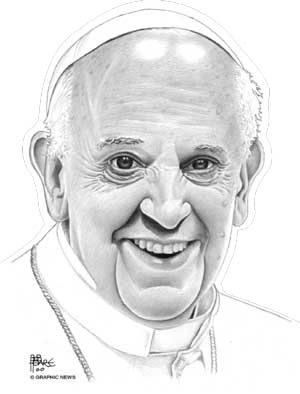Reply To:
Name - Reply Comment
In a historical encyclical or policy statement aimed at saving Mother Earth from the catastrophe of self-destruction, Pope Francis on Thursday called on the world’s rich nations to begin paying their grave social debt to the poor and take concrete steps on climate change. He warned that failure to turn around from the path of destruction would be a grave risk to our common home, mother earth, which a selfish if not senseless world had turned into a pile of filth.

The much awaited 180-page encyclical on the environment calls for immediate and effective action to gradually reduce the use of fossil fuels—petrol, diesel, kerosene, natural and liquid petroleum gas. Fossil fuels are hydrocarbon deposits such as petroleum, coal, or natural gas, derived from the accumulated remains of ancient plants and animals and used as fuel. Carbon dioxide and other greenhouse gases generated by burning fossil fuels are considered to be some of the principal causes of global warming. Contrary to what many people believe, fossil fuels are not the remains of dinosaurs. Most of the fossil fuels we find today were formed millions of years before the first dinosaurs.
The Pope’s letter, hitting the headlines all over the world, expressed a justifiable anger of an activist who was sincerely concerned about the enslaved poverty of billions of people. The 78-year-old pontiff who drew the biggest ever crowd in Sri Lanka’s history when he came here in January this year, blamed the indifference of the rich and powerful sections who had misused the world’s resources for about 200 years and brought about the apocalyptic crisis for humanity and Mother Earth.
The Pope said the world had accepted a cheerful recklessness in its approach to the issue, lacking the will to change habits for the good of the Earth. He pointed out that climate change had become a global problem with grave implications-- environmental, social, economic, political and for the distribution of goods.
The document was issued as the Pope prepared for his visit to the United States where he would address a joint session of congress and make the keynote speech at the United Nations General Assembly.
The theme of his speeches will be on climate change capturing the Pope’s deep disquiet about the direction of the modern world, the way technology and the myth of progress are leading the world to look at human beings as commodities and exploit nature.
Rejecting criticism by conservatives, specially the US Republican party Presidential candidate who say religious leaders are not competent to get involved in scientific affairs, a Papal spokesman said science was a public domain and a subject matter that anyone could get in to.
The Pope who was elected in 2013 and has put social justice and reform of the church at the heart of his papacy, said on Thursday that his encyclical should not be read as a green manifesto, but instead as a social teaching. Most analysts see it as a Magna Carta or a new covenant to save Mother Earth.
How will Sri Lanka respond? On Thursday night the Jathika Hela Urumaya leader Ven. Athuraliye Rathana Thera called for a total ban on glyphosate and other harmful agro-chemicals which had poisoned or polluted Sri Lanka’s soil, ground water and food. In a TV interview he said the former President, despite several appeals, had refused to ban the import of agro-chemicals and thereby allowed multi-national giants like Monsanto to turn Sri Lanka’s agriculture into a dangerous agribusiness. The prelate thanked President Maithripala Sirisena and the new government for their courage in banning glyphosate and said he hoped there would be a gradual ban on all agrochemicals with Sri Lanka going into the low cost and safer organic farming.